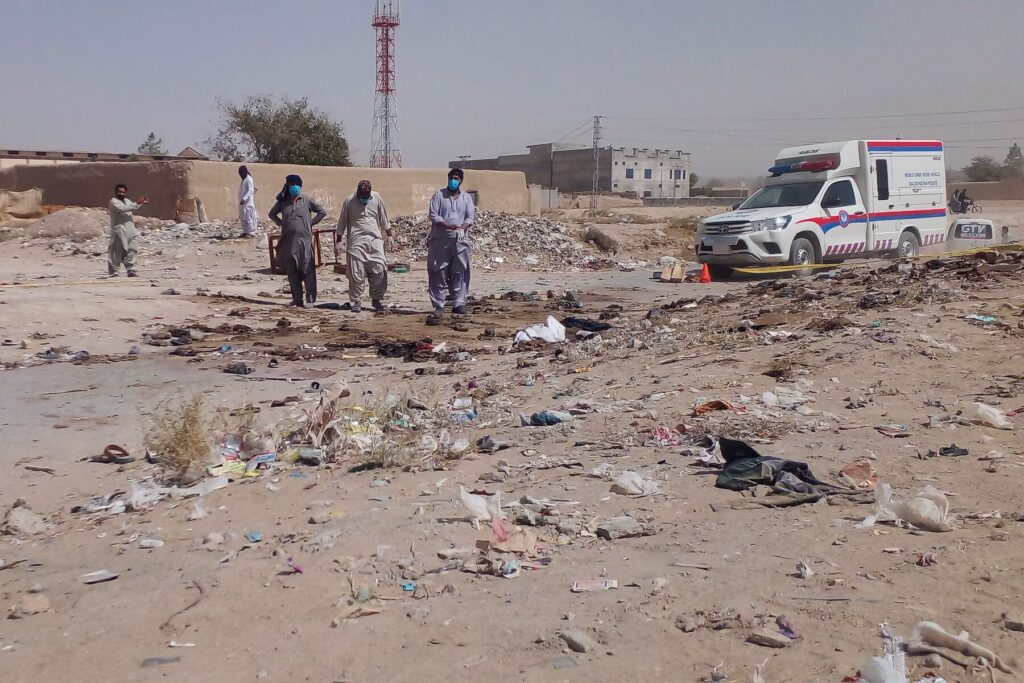Unveiling the Tragedy: Pakistan Gripped by Twin Blasts
Tragedy Strikes Mastung: A Grim Day for Pakistan
In a heart-wrenching incident that unfolded on Friday, the serene atmosphere near a mosque in Mastung, Balochistan, was shattered by a devastating suicide attack. The repercussions were severe, with at least 50 lives lost and more than 50 individuals left grappling with injuries. The tragic event transpired during a gathering to celebrate the birth of the Prophet Muhammad, turning a day of joy into one of mourning.
Balochistan Declares Emergency: Responding to the Crisis
In the aftermath of the blast, Balochistan declared a state of emergency, grappling with the profound impact of the incident. The explosion, confirmed as a suicide blast by Balochistan’s police chief Abdul Khaliq Sheikh, claimed the life of a senior police officer who valiantly tried to thwart the attacker. The scenes from Mastung depicted the urgency, with emergency responders and locals banding together to rescue the injured.
Silence Surrounds Responsibility: No Claim, Only Grief
Amidst the chaos, a notable absence emerged – no group stepped forward to claim responsibility for this heinous act. The silence added an unsettling layer to an already distressing situation. Interior Minister Sarfraz Bugti condemned the attack, labeling it a “very heinous act” and decrying the broader trend of “terrorist attacks” in the region.
Peshawar City Echoes Mastung: Another Mosque Targeted
Simultaneously, chaos ensued in Khyber Pakhtunkhwa province, near Peshawar City, as a separate blast rocked a mosque. The incident unfolded with two suicide bombers intercepted, and a vehicle laden with explosives halted. The timely intervention prevented a potential catastrophe, showcasing the valor of the security forces.
The Tangled Web of Violence: Previous Incidents Cast a Shadow
Balochistan, Pakistan’s largest province bordering Afghanistan and Iran, has been a recurring target for armed groups, including the Tehrik-e Taliban Pakistan (TTP) and the Islamic State group. Notably, the TTP denied involvement in the Mastung blast, asserting that such attacks were against its policies. This denial raises questions, adding complexity to an already intricate web of violence.

A Puzzling Landscape: Denials, Attacks, and Counteractions
The TTP’s denial follows a recent statement where the group “vehemently condemned” the attack in Khyber Pakhtunkhwa, emphasizing that “mosques, schools, and public gatherings are not part of our targets.” However, recent events have showcased the volatile nature of the region, with security forces thwarting a TTP attempt to “infiltrate from Afghanistan,” resulting in the death of three group members.
Hangu Mosque: Collateral Damage and Uncertain Casualties
In the wake of the Peshawar incident, uncertainty prevails in Hangu, where a mosque, part of a police complex, bore the brunt of the blast. The structural damage, compounded by a collapsed roof, leaves the number of casualties unknown. The mosque, designed to accommodate 40 to 50 people, now stands as a somber testament to the unpredictable nature of violence in the region.
Conclusion: A Region Grappling With Instability
As Pakistan grapples with the aftermath of these tragic events, the broader picture emerges – a region caught in the crossfire of violence, where denial and counteraction weave a complex narrative. The incidents in Mastung and Peshawar City underscore the urgent need for a comprehensive approach to security and stability. The silence of the perpetrators adds an ominous layer, leaving the nation in mourning and the world questioning the tangled web of violence.